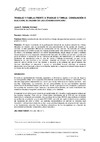Please use this identifier to cite or link to this item:
https://accedacris.ulpgc.es/jspui/handle/10553/74160
| Title: | Trabajo y familia frente trabajo o familia: conciliación o elección, el dilema de las jóvenes esposas | Other Titles: | Work and family against work or family: Conciliation or election, the dilemma of young wives | Authors: | Cañada Vicinay, Juan Antonio | UNESCO Clasification: | 630909 Posición social de la mujer 560502 Derecho civil 530908 Trabajo social y servicios sociales |
Keywords: | Conciliación de vida de familia y trabajo Desigualdad por género y estado civi Jóvenes esposas |
Issue Date: | 2007 | Journal: | Architecture, City and Environment | Abstract: | El rápido incremento de la participación laboral de las mujeres durante las últimas décadas en nuestro país se acompaña de una aproximación de las pautas de mujeres y varones, si bien persisten diferencias sustanciales en los jóvenes. Se constata un cambio generacional en el sentido de que las mujeres jóvenes están más instruidas que los varones de su edad y sin embargo adolecen de menor empleabilidad, mayor riesgo de paro y exhiben mayor propensión a la separación temprana del mercado. El análisis por género y estado civil pone de relieve la interacción de los mercados de trabajo y de matrimonios y su reflejo en los problemas de conciliación entre la vida de familia y trabajo remunerado, ya que: a) las diferencias se circunscriben a los casados, teniendo los solteros de ambos géneros una posición laboral similar; b) en los jóvenes y respecto a los solteros del propio género, los maridos intensifican su presencia y ganan en estabilidad laboral, mientras las esposas desinvierten en el mercado a favor de la familia, lastrando su trayectoria laboral futura desde el comienzo de la vida profesional. The rapid increase of women entering the workforce over the last few decades has been accompanied by an approximation in the models of participation between men and women, although substantial differences still remain amongst young people. A generational change can be detected in the sense that young women are better trained than men of the same age; however they have lesser access to employment, higher risk of unemployment and show a higher propensity for stepping out earlier from the labour market. The analysis by gender and civil status highlights the close interaction between labour markets and marriage, and its effect in the problems of conciliating family life and professional work, owing to: a) differences which occur within married couples, whereas single men and women both have a similar employment position; and b) in comparison with young single men, married men strengthen their presence in the labour market and gain in employment stability. By contrast young married women tend to disinvest in the labour market in favour of the family, thereby burdening their future employment prospects from the start of their professional life. |
URI: | https://accedacris.ulpgc.es/handle/10553/74160 | ISSN: | 1886-4805 | DOI: | 10.5821/ace.v2i5.2408 | Source: | Architecture, City and Environment [ISSN 1886-4805], v. 2 (5), p. 381-400, (Octubre 2007) |
| Appears in Collections: | Artículos |
WEB OF SCIENCETM
Citations
1
checked on Feb 25, 2024
Page view(s)
53
checked on Jan 10, 2026
Download(s)
38
checked on Jan 10, 2026
Google ScholarTM
Check
Altmetric
Share
Export metadata
Items in accedaCRIS are protected by copyright, with all rights reserved, unless otherwise indicated.
